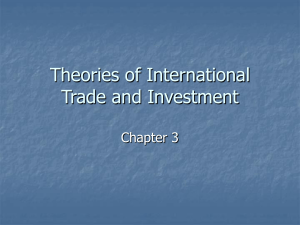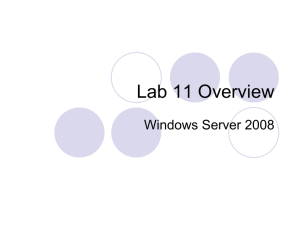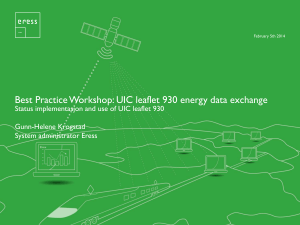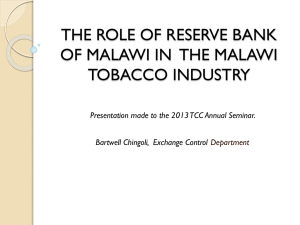Implications for the Way Forward - CUTS Centre for International
advertisement
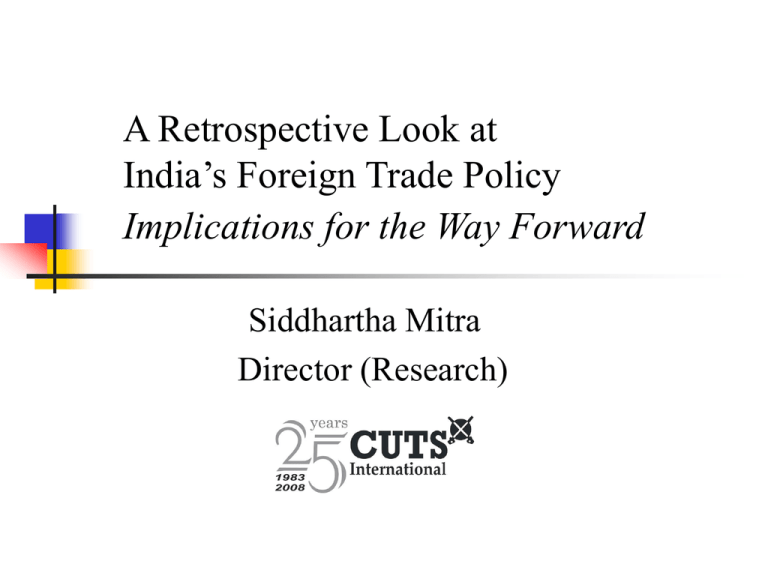
A Retrospective Look at India’s Foreign Trade Policy Implications for the Way Forward Siddhartha Mitra Director (Research) Outline • Indian Civil Society and Foreign Trade Policy (FTP) • Rationale, Long term and Short Term Objectives • FTP 2004-09: Major Schemes and Provisions • FTP 2004-09: Critique • FTP 2009-14: A Review of Major Changes • Has FTP 2009-14 Improved Upon FTP 2004-09? • In Conclusion: A Road Map for future FTPs 2 Indian Civil Society and FTP • Rationale for civil society to play a role in formulation and implementation of FTP – International policy regimes such as the WTO and trading agreements impact Indian stakeholders significantly – Indian foreign trade policy helps these stakeholders benefit from the above regimes/agreements – However, centralised policy formulation is a roadblock to leveraging of benefits – Indian civil society has to play the role of linking the grassroots to the policy makers • Role of civil society (agenda of Granite II): – Demystifying the trade policy – Taking feedback from those affected – Communicating this feedback to policy makers and advocating 3 for policy changes that meet implied needs Rationale, Long Term and Short Term Objectives • Rationale: Policies needed to facilitate rapid and sustained inclusive economic growth by incentivising and enabling positive stakeholder (producers, exporters and associated labour) responses to international trade regimes and trade agreements • Long term objectives of FTP – Promotion of exports through an increase in competitiveness of Indian products to positively impact, among others, employment generation and therefore poverty alleviation • Short term objectives – FTP 2004-09 » Increase India’s share in global trade from 0.8 to 1.5 percent (1.45 percent achieved in 2008) – FTP 2009-14 » Stop and reverse the declining trend in exports brought about by the global recession » Double India’s percentage share in global trade within five years through an annual growth of 15 percent in exports • FTP Channels – Infrastructure improvements, reduction in transaction costs, refund of levies 4 Schemes under FTP 2004-09 • Assistance to States for Infrastructure Development of Exports (ASIDE) − Development of roads connecting production centres with ports − Development of minor ports and jetties − Setting up of inland container depots and container freight stations • Market Access Initiative (MAI) and Market Development Assistance − Finance for promotion of medium scale exports (export promotion councils and industry and trade associations) • Towns exporting agricultural/non-agricultural produce in excess of Rs. 250/1000 crores classified as Towns of Export Excellence (TEE) − Priority for assistance under ASIDE − Assistance under MAI for providing focused technological services • Export Promotion Capital Goods (EPCG) Scheme: Facilitates import of capital goods at reduced duty for select sectors 5 Schemes under FTP 2004-09 (2) • Provision of export house status to exporting entities based on recent performance – Customs clearances on self declaration basis – Exemptions from furnishing of bank guarantees • Vishesh Krishi and Gramudyog Yojana – Reduction in duty payments for import of agricultural inputs by » 7.5 percent of value of exports of flowers, fruits and vegetables » 5 percent of value of other agricultural exports • Focus Market Schemes (FMS) – Reimbursement of duty payments of up to 2.5 percent of export value so as to compensate for high freight transport costs to select international markets • Focus Product Scheme (FPS) – Same incentive as FMS but for products with high employment intensity produced in rural and semi-urban areas 6 FTP 2004-09: Critique • Centralised formulation and implementation – A participatory exercise involving grassroots level stakeholders is needed • Special programmes for small producers/exporters needed -benefits perceived as accruing to large producers/ exporters – only such stakeholders were cognisant of various FTP associated schemes: » only these had enough human physical /capital to take advantage of training and incentives » low level of literacy among others » lack of systematic dissemination of information by the government • ASIDE has not functioned effectively in upgrading infrastructure: exporting boosting effect of other schemes has been blunted • Lack of coordination among various levels of the government: well formulated schemes did not yield anticipated benefits 7 FTP 2004-09: Critique • Schemes are biased towards welfare enhancement of exporters without adequate attention to those producing exportables • Should provide a mechanism to achieve better coordination among various stakeholders in the supply chain – E.g. Facilitate the formulation and implementation of formal contractual arrangements between exporters and farmers • Incentives should be suitably modified in sectors such as fisheries where there might be a tradeoff between sustainability and volume of exports 8 FTP 2009-14: A Review of Major Changes • Market and product diversification − FMS scheme » Extended to 26 countries » Reimbursable portion in tariff payments increased from 2.5-3 percent of exports − FPS scheme » Duty credit increased from 1.25-2 percent of the value of exports » Automobiles and engineering products included under FPS • Boost to technological upgradation − EPCG schemes » Duty free import facility offered in regard to certain engineering and electronic products, chemicals and pharmaceuticals, apparels and textiles, plastics, handicrafts etc » Existing three percent scheme simplified to promote usage − Additional duty credit of one percent of the value of past exports to sectors dealing with leather products, engineering goods, handicrafts etc for import of capital goods • Intention declared to promote exports of green products 9 FTP 2009-14: A Review of Major Changes • Simplification of procedures − Number of samples eligible for import by exporters have been increased from 15 to 50 − Shipping bills applicable for one Export Promotion Scheme can be converted for use in another within ‘three’ months of issue, instead of the earlier ‘one’ − Procedure for duty free sale of goods has been simplified and the validity of the required certificate has been increased from one to two years − Free import of reference fuels of upto 5000 litres per annum allowed for automobile firms with their own R&D establishments − Simplification of application and redemption forms under EPCG • Reduction of transaction costs − Across the board reduction of application fees − Export Promotion Councils advised to issue membership certificates online − Verification of credit scrips by customs would be done through electronic message exchange between customs and DGFT − Formation of inter-ministerial taskforce to redress problems of exporters − Inter-state Trade Council being set up to allow for closer interaction 10 between centre and states Has FTP 2009-14 Improved Upon FTP 2004-09? • Positives: Important steps taken to reduce transaction costs, simplify procedures and incentivise exports in recessionary conditions • Areas where desired interventions have not been forthcoming − Not much done to promote labour intensive exports – inconsistency with stated long term objective − Markets covered by the FPS are at odds with the products covered − Not enough attention has been paid to alleviation of infrastructure deficiencies − Mechanisms for directly involving the grassroots in trade policy formulation are still absent − Schemes still cater mainly to exporters and not to producers of exportables 11 In Conclusion: A Road Map for future FTPs • ASIDE scheme needs a major revamp − Higher allocations − More accountability in regard to effectiveness of spending − Should be also used to create infrastructure such as power, interior roads etc that makes production for export more efficient • Institutionalisation of a process for trade policy formulation that is transparent and builds on a structure of consultations extending right from the grassroots to the central government • Targeted schemes needed for producers of exportables − Government help needed to facilitate their entry into formal enforceable contracts with exporters − Training programmes which help them meet the product and process standards imposed by developed countries 12 Thank You Siddhartha Mitra Director (Research), CUTS sm2@cuts.org http://www.cuts-international.org 13


